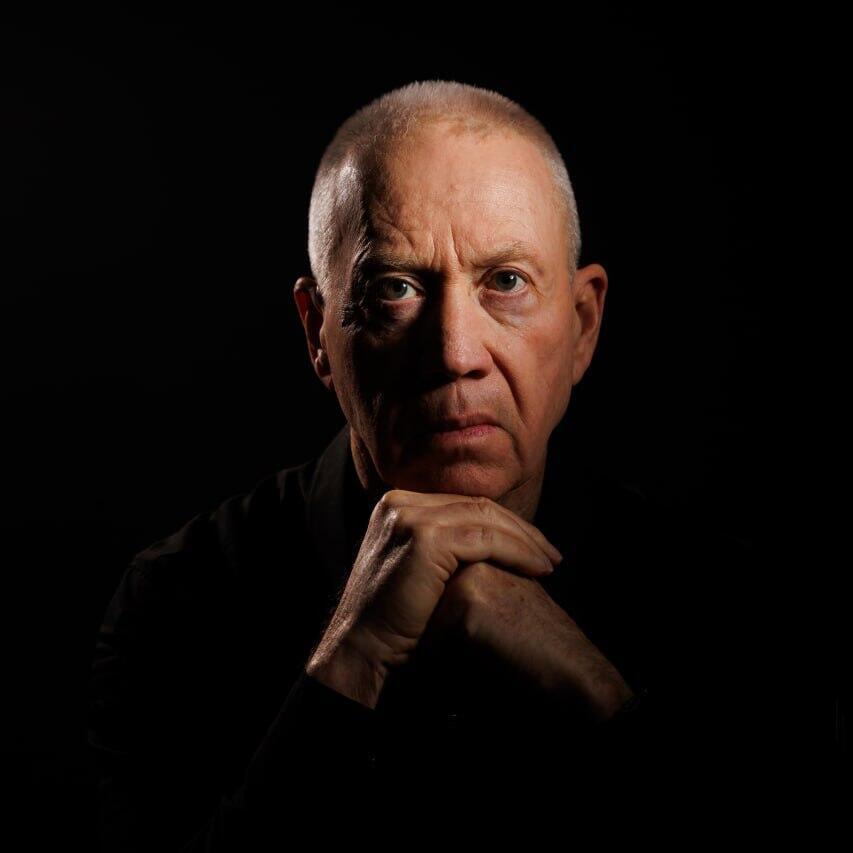For the first part of the article – click here
Part Three

As defense minister, Gallant maintained constant contact with the families of the hostages. He watches the release of the hostages in the latest deal on television. "I followed it with deep emotion. It was incredibly moving for me. From the very beginning of the war, I made a tremendous effort to ensure that the female soldiers were first classified as women, and only then as soldiers."
This deal was essentially the same one the security establishment had put forward in the spring of 2024. Its core remained unchanged: there was no commitment to halting the war, only a partial release, and Israel would withdraw from the Netzarim Corridor.
"This formula was presented in April. It was discussed in a War Cabinet meeting where a unanimous decision was made. A mandate was given to shape the negotiations: the deal aimed for the release of 33 hostages but could go as low as 18 as a minimum threshold. There was complete consensus among the security establishment and all the ministers. The prime minister accepted it. This was midday, during Passover, 2023."
Then, something highly unusual happened. "A few hours later, in the evening, a full Cabinet meeting was held. Finance Minister Bezalel Smotrich came in and said, ‘If there’s a deal for 18, we will leave the government.’ He wasn’t even supposed to know about it. The ministers had no idea what he was talking about."
Gallant is making a remarkable accusation. The gravity of this moment is crucial. Israel had set a confidential minimum position for negotiations: no deal would proceed without at least 18 hostages being released. This was a state secret—no one was supposed to know it, for obvious reasons, to prevent Hamas from using it as their final demand. Yet within hours of this minimum number being set in a closed forum, it was leaked to the finance minister, who then declared it openly in a full Cabinet meeting. Effectively the equivalent of announcing it on the Knesset floor.
"A few hours later, the number 18 was published in the media. This happened in the middle of negotiations between Shin Bet representatives and the Egyptians. I received reports that, following our decision regarding the Netzarim Corridor and the 33-hostage target, the Egyptians said there was a breakthrough, and progress was possible. A day or two later, we got word that Hamas told the mediators: ‘They’re talking to us about 33, but the Israeli media reported 18—so why agree to 33 when we can get a deal for less?’ And the whole deal fell apart. The next time it was revived was at the end of May, in President Biden’s speech."
But what happened with this leak?
"I don’t know."
Have you spoken to the prime minister about this?
"Yes. I don’t want to elaborate."
The tunnel where Hersh Goldberg-Polin and other hostages were killed
(IDF)
Gallant may not want to elaborate, but reports indicate that Netanyahu called him, shaken—whether genuinely or not is debated—and informed him that "everything was ruined" now that the details had leaked to the media. As a result, Netanyahu claimed, the negotiation team’s mandate would have to be revised. Gallant responded by demanding that Benny Gantz be brought onto the call, clarifying that if Netanyahu was backtracking, the issue would need to be brought back to a vote in the War Cabinet. Netanyahu backed down.
The security establishment suspected that Netanyahu’s own people had leaked the minimum threshold to Smotrich to sabotage the deal. Washington believed the same.
"This deal could have been completed even after Biden’s speech. On July 3, Hamas accepted the deal reached. I told the hostage families: ‘The conditions are in place.’ And I believe the conditions were already in place at that point. But we didn’t respond to Hamas. In fact, we didn’t respond at all until July 28. On that day, the issue of the Philadelphi Corridor was added (as an Israeli condition). I told Netanyahu: ‘If Hamas has given us a positive answer, and we’re about to respond with a rejection, at least send the response the next day. Why waste three weeks? Why drag this out? We need to move fast.’
"In reality, we could have secured the same deal with more hostages at a lower cost. An additional 110 prisoners sentenced to life were later included—who were not even part of the discussions at that time. What you see today is essentially the same as what was on the table in July."
"Every draft year, a quarter of Jewish 18-year-olds—25%—are ultra-Orthodox. One in four. We cannot afford not to draft them, or at least the vast majority of them. That is what I fought for, because of the war. This is no longer just a social necessity; it has become a national necessity."
Meanwhile, hostages died. Why didn’t this deal happen?
"It was explicitly stated—by Smotrich and Ben-Gvir. They dragged the Cabinet in their direction. And in my view, that was a mistake. I remind you that in August, there was a vote on the Philadelphi Corridor (making Israel's presence there a condition to any deal, n.e), and I was in the minority. I voted against making it a condition, while everyone else voted in favor. I told them: ‘Either go back to my proposal, or we will lose the hostages.’"
What you’re saying is serious. You’re saying that hostages died because of political maneuvering by Smotrich, Ben-Gvir and Netanyahu’s capitulation to them.
"You can draw your own conclusions. I am telling you as clearly as possible: this deal is nearly identical to the one that was on the table before. I have no expectations from Hamas. These are vile murderers who must all be eliminated—that has been my mission in life since 1987 when Hamas was founded. Certainly in the past two years as defense minister. But I do have expectations from the government of Israel. In my view, bringing the hostages home is a supreme national and moral duty. It is part of Israel’s legacy, it is central to the IDF’s code of ethics and it is an explicit war objective."
The question remains—did the Israeli government, which you were part of, do everything it could to bring the hostages home?
"I do not believe that the government of Israel did everything it could to bring the hostages home."

How do you respond to the perception that Hamas emerged victorious from the hostage deal—not just because they survived, but because of the images of thousands of Hamas supporters celebrating in Gaza, even as much of the enclave lay in ruins and many thousands had been killed?
"Hamas lost 20,000 fighters. Its infrastructure was dismantled—its production lines, its tunnels and more. But to replace a regime, you need an alternative. If you keep plowing the land without planting anything, nothing new will grow."
Netanyahu kept saying we were on the verge of “total victory.” But you yourself said, and I quote: "Hamas is collapsing from within," "Hamas is a dismantled organization," "Hamas has lost control, has no way to rearm," "Hamas’ Gaza station isn’t answering," "There’s a bidding war over who will rule Gaza." Yet, despite all that, Hamas still controls Gaza—even without the deal, that was the reality.
"You need to understand something. Military achievement is not the same as victory. Military victory is a component of victory, but true victory requires a political process. And that process never happened. I've been dealing with this for over a year. On October 26, 2023, I presented a plan that outlined a second phase in Gaza: continuing military operations while simultaneously building an alternative to Hamas rule. The plan included an implementation framework—forces made up of non-Hamas Palestinians, observers from Arab countries and private companies for security. I personally traveled to meet Arab leaders to discuss this. The government refused. They wouldn’t allow it to move forward. And the result is that we got stuck on the political front.
"Now, if you have 5,000 or 10,000 terrorists who still have uniforms—even if they don’t have rockets—they can put on a good show for the media. I don’t underestimate them. And if we allow them to grow, they will rearm."
Some argue that a non-Hamas government in Gaza was never realistic. The current line from Netanyahu’s camp is that the failure was the military’s fault—IDF leadership chose repeated raids instead of holding and clearing territory, leaving Israel with no choice but to make a deal.
"Netanyahu thought the same way I did—but only in private meetings, where Smotrich and Ben-Gvir weren’t present. He doesn’t want to control Gaza in a military occupation. Anyone who wants military rule in Gaza is actually saying, ‘We will lose hundreds of soldiers, and after that, we’ll withdraw because we’re not staying there forever.’ The truth is, if you don’t want to develop an alternative governance in Gaza, then what you’re really saying is: you prefer Hamas to rule.
"Israel will not rebuild settlements in Gaza, no matter how much Smotrich and Ben-Gvir push for it—they know it won’t happen. Netanyahu understands that. Military rule isn’t freedom of action for the IDF. Freedom of action is being able to kill who needs to be killed and strike who needs to be struck. Military rule means running daily life—and that should be done by Palestinians, not Israelis. IDF soldiers, and certainly Israeli civilians, should not remain there forever. We have no business being there. Gaza isn’t Jerusalem, and it’s not Mount Hermon. Unfortunately, whether this war lasts a short or long time, they—Smotrich and Ben-Gvir—will eventually come around to my position. But I don’t want to lose our best soldiers over it along the way.”
If in January 2025, Israel returned to the same hostage deal that was on the table in May 2024, and in the meantime, you—the security establishment —dismantled Iran’s "axis of resistance," what does that say about Israeli success in Gaza?
"In order to replace a regime, plowing the ground isn’t enough. You have to allow something new to grow there. But because anything new would involve Palestinians that nobody likes—including me—the result was that we didn’t allow it to happen. That left us with only two choices: Hamas or Israel. And once you make it Hamas vs. Israel, the moment you leave for even 42 days (for the cease-fire), Hamas regrows."
Cabinet ministers have said Chief of Staff Herzi Halevi endured unprecedented humiliation in meetings, long before calls for his resignation intensified.
"The chief of staff is a courageous, composed, calculating and highly decisive leader. And he operated under incredibly difficult conditions. First, because he was fighting around the clock. Second, because—living in this country—you saw the political attacks against him, something that never happened before in Israeli wars.
"From my conversations with him, I knew that the moment the next hostage deal was reached, he would step down. We didn’t know when the deal would happen, but in our discussions, it was clear that was his plan. I believe he chose the right moment."
And what about accusations that the IDF General Staff, and Halevi in particular, were not aggressive enough?
"Where were all these critics on October 11, when we proposed the most aggressive operation of all? Where were they then?"

Gallant’s next dismissal came as no surprise, just a week after a stunningly successful Air Force strike in Iran. It was clear that Netanyahu was moving full speed ahead with his plan—especially due to pressure from the ultra-Orthodox parties as to the exemption law they were demanding.
"On a personal level, there were no issues," Gallant says. "I can work with the prime minister. Every major decision in this war, we made together. We had disagreements on fundamental issues. I believed that since the hostages' lives were hanging by a thread, we needed to act as quickly as possible. He did not agree with me on that. The second issue was everything related to the endgame in Gaza."
The final straw for Netanyahu, almost without a doubt, was the military draft. The ultra-Orthodox parties had threatened—and continue to threaten—to bring down Netanyahu’s government over the issue, and Gallant refused to sign off on a law that would allow wholesale draft exemptions to continue. He has no regrets.
"Look at reality for a moment. We are at war. Hundreds of soldiers have been killed, thousands wounded—many of whom will never return to service. We’ve lost the equivalent of two infantry brigades in sheer numbers. We need to replenish that. There are three ways to do it. One is extending mandatory service, which I recommended a year ago—to 36 months. The second is extending reserve duty, which is already happening automatically. And the third is drafting additional populations. Now, I want you to understand the situation. Every draft year, a quarter of Jewish 18-year-olds—25%—are ultra-Orthodox. One in four. We cannot afford not to draft them, or at least the vast majority of them. That is what I fought for, because of the war. This is no longer just a social necessity; it has become a national necessity. And on top of that, there was no legislation in place for exempting them. Now, that’s the principle of the matter. As for why I was fired—ask the prime minister. But I can tell you for certain: I wasn’t fired because I was a bad defense minister."
You are constantly attacked from within your own party. Likud MK Nissim Vaturi said about you that "Gallant and Gantz are kissing." Minister David Amsalem claimed your conduct "undermined Israel’s security."
"I won’t respond to every person who says this or that. I acted according to my priorities: first, the State of Israel. After that, the IDF and the security agencies. And only after that—everything else, including myself. That’s how I have always worked, that’s how I conducted myself in this war. And I was willing to pay the price for it. What mattered to me was winning the war. And for 13 straight months, 24/7, as defense minister—I did just that. I managed this war. All paths led to me."

Since leaving office, Gallant has traveled to the U.S. twice for personal trips, flying on regular commercial flights—flights that, due to a technical issue, could easily be rerouted to Spain or Portugal, where he would face a high risk of arrest under the International Criminal Court’s warrant, issued on allegations of genocide in Gaza. Yet he continues to travel as usual. According to him, military leaders around the world praise Israel’s conduct in the war.
<< Get the Ynetnews app on your smartphone: Google Play: https://bit.ly/4eJ37pE | Apple App Store: https://bit.ly/3ZL7iNv >>
"I have personal ties with senior officials in democratic governments—defense ministers, leaders, chiefs of staff. What I hear is universal praise—for Israel’s military capabilities, for the IDF’s ethics under the most difficult conditions. General David Petraeus, an authority on modern warfare, gave me a book he wrote about wars from 1945 to today. He told me, ‘I regret writing this book before the war, because this is the most brilliant military campaign since World War II. Nothing like this has ever happened before. What you achieved here is unprecedented. And you fought under the toughest conditions possible—against an enemy embedded underground, among civilians and so on.’”
Aren’t you afraid of being arrested abroad because of the Hague warrant?
"I am proud to be accused of defending the State of Israel. In the early days after October 7, I coined the phrase that this was the most devastating day for the Jewish people since World War II. Leaders and officials from around the world came to me, and I told them: 2023 is not 1943. The Jewish people now have the ability to defend themselves, and I was responsible for that—and I did it. That is what I did, and I am proud of it. Thank God, unlike my grandparents and their parents before them, we have a strong army."
4 View gallery


'I am proud to be accused of defending the State of Israel': Destruction in Khan Younis
(Photo: Yoav Keren)
You've seen the destruction in Gaza, the images of many dead civilians. There is no doubt that thousands upon thousands were killed. Consider what we know about hostages who were mistakenly killed by the IDF—doesn’t that indicate what might have happened across Gaza?
"In war, mistakes are made—just like in everything else. The difference is that in war, mistakes come with heavy costs. In the end, decisions are in the hands of commanders at different levels, all of whom did their best. And yes, mistakes were made. We don’t need proof of that—we know it happens. I believe our mistakes were smaller than those of other armies, but they exist, and the consequences are always tragic. I deeply regret that. I never wanted to harm a single Palestinian civilian. And I wasn’t alone in that. The chief of staff and many others worked tirelessly to provide humanitarian aid wherever possible."
At the start of the war, you declared: "I have ordered a complete siege on Gaza—no electricity, no food, no fuel, everything is closed." But then you worked to supply those things. Where do you actually stand, Yoav Gallant—on providing aid or withholding it?
"There were different phases at the beginning of the war. Early on, it became clear that cutting off fuel wouldn’t destroy Hamas' tunnel electricity supply—other things would collapse first. After the initial stage, we shifted to a strategy dictated by necessity. First, we needed humanitarian aid to enable our military operations. And second, there was a practical reality: without allowing humanitarian aid in, there would be no resupply (military ammunition from the U.S.)—not for Gaza, but for us. Everyone understood that—especially the prime minister and me."

He remains optimistic about the future: "First and foremost, I believe in the eternity of Israel. Secondly, I believe in the resilience of Israeli society—we will always find solutions, even if we veer off course at times. I thought about this even in the darkest hours of October 7. I draw great strength from the Israeli public’s ability to endure and overcome. And I believe that whether it’s our struggle for democracy, our national narrative or any other challenge, we will stabilize things and fix what needs to be fixed."
Do you intend to run for prime minister?
"I am a soldier of the state. The State of Israel is my life’s work—I have dedicated my life to it. As long as I can help, contribute and lead, I will do so. Beyond that, there are no elections right now. It’s not on the agenda."








